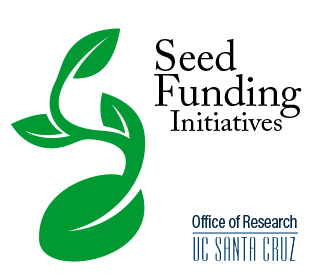Campus News
Seed funding grants support plans for innovative research centers
The UCSC Office of Research has awarded seed funding to six campus research groups to support their efforts to develop innovative new research centers.

The UCSC Office of Research has awarded seed funding to six campus research groups to support their efforts to develop innovative new research centers.
The Seed Funding for Center Scale Research Initiatives program supports collaborative, multidisciplinary proposals and aims to bring together faculty with diverse backgrounds, areas of inquiry, and expertise.
“Our goal with this program is to make strategic investments in collaborative and multidisciplinary projects that will lead to innovative, inventive, and serendipitous discoveries and findings with big impacts and significant long-term funding,” said Scott Brandt, vice chancellor for research. “Each of these projects meets these criteria and we are very excited to see what they will produce going forward.”
The first cohort of awards includes the following groups:
- “An Interdisciplinary Research Network for Astrobiology at UCSC,” led by Natalie Batalha, professor of astronomy and astrophysics, explores new models of planetary development and how it could lead to the conditions for life, and furthers our understanding of the prevalence of life in the universe.
- “Developing a Collaborative, Interdisciplinary Center Research Proposal for Energy-efficient Magnetoelectronics,” led by David Lederman, professor of physics, will design 2-dimensional material layered stacks to precisely control performance properties such as magnetism and superconductivity at the quantum scale for future microelectronics.
- “The Applied Artificial Intelligence Initiative,” led by J. Xavier Prochaska, professor of astronomy and astrophysics, will continue to build bridges across disciplines and between industry, academia, and under-represented minorities to develop UCSC as a leader in the growing field of artificial intelligence.
- “Building Resilience to Climate Change in Crops with Artificial Intelligence and AgTech Devices,” led by Marco Rolandi, professor of electrical and computer engineering, will use bioelectronic devices paired with AI algorithms that can regulate specific plant hormones to increase agricultural yields and crop resilience.
- “Computation-Aware Algorithmic Design for Cyber-Physical Systems for Intelligent Transportation,” led by Ricardo Sanfelice, professor of electrical and computer engineering, will build a framework for merging feedback control algorithms with computing system designs to reduce operational risks and optimize performance for intelligent transportation systems and other cyber-physical systems.
- “UCSC Center for Open Access Splicing Therapeutics (COAST),” led by Michael Stone, professor of chemistry and biochemistry, will pursue meaningful precision therapies for patients with rare diseases. The COAST team will leverage their ribonucleic acid (RNA) expertise to intervene with small populations where the medical industry cannot make cost effective treatments economically viable.
Each group will use their seed funding over the next year to pursue center-scale research proposals. The awards of $60,000 to $75,000 provide support for grant planning, capacity building, research development activities, and acquisition of key data.